6 Incredible Twin Engine RC Planes
Radio controlled airplanes tend to captivate minds like no other RC models can. They provide heaps of fun for the pilots who fly them and those who watch. This introduction and guide reveal the unique qualities of twin engine RC planes. There’s just something special about models with two motors. They look fantastic, sound great, and are usually bigger than their single prop counterparts.
| Budget |
|---|
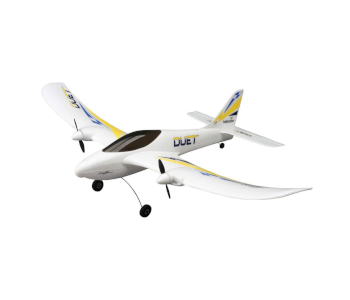 |
| HobbyZone Duet RTF HBZ5300 |
| 4.5/5.0 |
| Flight Time: 8 minutes |
| Material: Polystyrene |
| Affordable, pre-assembled, beginner-friendly, fun. |
| Check Amazon |
| Best Value |
|---|
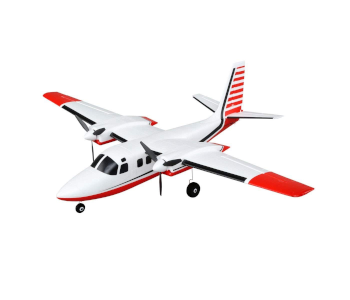 |
| EFL UMX Aero Commander |
| 4.7/5.0 |
| Flight Time: 20 minutes |
| Material: Foam |
| Aerobatics, striking design, brushless motors, long flight time. |
| Check Amazon |
| Top Pick |
|---|
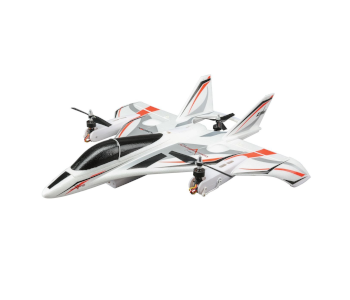 |
| E-flite Convergence VTOL |
| 4.7/5.0 |
| Flight Time: 7 minutes |
| Material: Z-foam |
| Easy to fly, simple transmitter setup, brushless motors. |
| Check Amazon |
Why RC Pilots Like to Fly Twins
RC planes with two engines are fascinating, but very different from single-engine models. Some plane makers target specific twin-engine models at first-time fliers. I say think before you commit. Most of these aircraft are not ideal for raw beginners. That’s because they’re more challenging to fly than single prop models. Having two electric motors also means there’s more to go wrong and focus on.
Okay, that’s the warning out of the way. Keep reading if you’re interested in piloting your first twin engine RC airplane. This introduction is not a flying tutorial—there are more qualified articles and RC forums for that. It does, however, give a few basic tips and suggestions on things to consider
Before You Buy a Twin Engine RC Plane
First-time considerations for twin engine RC planes may include the following:
- Models with motors closer together are easier to control in an engine-out situation
- Learn to fly using the rudder as it’s a vital skill in an engine-out emergency
- Tricycle landing gear is easier to control for first timers than tail-draggers
- Opt for a “trainer” plane if it’s your first twin-engine (see Best Budget pick below)
The remaining checks are the same as single-prop RC planes and can include:
- Set a minimum and maximum budget
- Consider the design and build quality
- Max flying time (battery life)
- Battery charging times
- Parts and accessory cost and availability
- RTF, ARF, BNF, and PNP (see next section)
- The remote controller or RC (transmitter)
Setting a min/max budget helps to narrow down the choices. The design and build of a plane are also significant but shouldn’t be the only factors. There’s never enough flying time on a single charge. Even so, some twin-engine RC planes can fly longer and further than others. Look at battery charging times too. Also, consider the cost and availability of spare batteries and other parts.
RTF, ARF, BNF, and PNP Defined
Sellers often use these abbreviations in the titles of their RC planes. Choose an RTF (ready-to-fly) model if you want a plane that’s ready to run straight out of the box. You must buy a few extra items for an ARF (almost-ready-to-fly) model. They can include things like a battery, a charger, and a few electronic components. And BNF (Bind-N-Fly) models have everything apart from the transmitter.
Some folks prefer BNF models if they already have a transmitter. Others favor BNF as they like to choose their controller (RC) for the model in question. PNP (plug-n-play) models also need a bunch of extras. These typically include a transmitter, receiver, battery, and a compatible battery charger.
About My Beginner’s RC Plane Guide
These mini-reviews look at six amazing twin engine RC planes. The models on this page are the result of expert opinions, real user reviews, and personal thoughts. The first three aircraft are Best Budget, Best Value, and Top Pick, in that order. The three under those are in price order lowest to high.
Twin Engine RC Planes Comparison Table
| Make and Model | Flight Time | Material | Price |
|---|---|---|---|
| HobbyZone Duet RTF HBZ5300 Airplane | 8 minutes | Polystyrene | Check Price |
| EFL UMX Aero Commander BNF Basic AS3X | 20 minutes | Foam | Check Price |
| E-flite Convergence VTOL BNF Basic | 7 minutes | Z-foam | Check Price |
| Flyzone RTF WWII B-25 Bomber Micro | 10 minutes | Foam | Check Price |
| HobbyZone Delta Ray BNF Twin Engine Plane | 7 minutes | Polyolefin | Check Price |
| Mini Convergence vtol Multirotor BNF Basic | 5 minutes | Durable EPO | Check Price |
1. HobbyZone Duet HBZ5300 Trainer Plane | Best Budget
Editor’s Rating: 4.5/5
Anyone who’s new to flying twin-engine planes should consider the Duet HBZ5300 Trainer. It’s small, lightweight, and comes with everything you need in the box to get airborne. Let’s take a closer look.
- Best feature 1: Virtual Instructor technology
- Best feature 2: Reasonably crash resistant
- Plus points: Affordable, pre-assembled, beginner-friendly, fun, fast charging
- Minus points: Restricted acrobatics, not good in the wind, short flight time
The Duet HBZ5300 is a ready-to-fly (RTF) trainer and one of the best value trainer planes around. Its Virtual Instructor technology provides effective control assistance for novice pilots.
Flying the HobbyZone Duet HBZ5300 Trainer Plane
What makes this plane so enjoyable as a trainer is that it’s hard to mess up. I doubt a novice could overbank or stall it even if they tried. It turns remarkably well for a model that doesn’t use ailerons. Having only three channels means more flight restrictions, but that’s what learners need. There’s still enough throttle, steering, and climb control to afford an enjoyable experience.
It’s reasonably impact-resistant with mild to moderate crash-landings on grassy surfaces. That’s due to its lightweight frame that puts very little stress on the structure. Nevertheless, it’s not advisable for inexperienced pilots to fly over hard areas. This twin-engine trainer sells well for good reasons. It’s fun, fast, and provides an enjoyable experience for a model in its class and price range.
The Not So Good
Pilots may get bored with the Duet HBZ5300 once they’ve developed flying skills. That’s because of its limited aerobatic capability—a result of the 3-channels and differential thrust. But then it is a trainer plane after all. It prepares pilots for advanced models with more channels and rudder control. Other setbacks are the plane’s inability to fly well in the wind and the short 8-minute flight time.
| Tech Specs |
|---|
| Model Type: RC trainer plane |
| Dimensions: 19.8 x 19.2 x 5” |
| Product Weight: 1.5 oz. (42.52g) |
| Material: Polystyrene |
| Model’s Range: 75 ft. (22.86 meters) |
| Battery Type: 150mAh 1S Li-Po |
| Charging Time: 45 minutes |
| Max Flying Time: 8 minutes |
| Controller: 3CH 2.4GHz transmitter w/ built-in charger |
| The Pros |
|---|
| Affordable RC trainer plane |
| Virtual Instructor technology |
| Ready-to-fly (RTF) model |
| Fun craft for beginners |
| Crash-resistant |
| Beginner-friendly |
| Fast charging time |
| The Cons |
|---|
| Restricted acrobatics |
| Not good in the wind |
| Short flight time |
2. EFL UMX Aero Commander BNF Basic AS3X | Best Value
Editor’s Rating: 4.7/5
This is the EFL UMX Aero Commander BNF Basic AS3X, but there’s nothing “basic” about it. It’s a lightweight RC twin-engine aircraft that provides pilots with rewarding flight experiences.
- Best feature 1: AS3X technology for enhanced flight stability
- Best feature 2: Takeoff or hand launch
- Plus points: Aerobatics, striking design, brushless motors, steerable nose wheel, long flight time
- Minus points: Nose wheel steering overly sensitive, Bind-N-Fly (also a pro)
The UMX Aero Commander executive plane has a striking red and white trim. It’s also a feature-packed flyer that offers excellent value. You need the following three items to complete this BNF Basic model:
- Full-range DSMX/DSM2 transmitter w/ 4+ channels
- Flight battery: 450-800mAh 2S LiPo
- Compatible battery charger
Flying the EFL UMX Aero Commander BNF Basic AS3X
Flying this ultra-micro twin-engine RC plane is a blast with the option to takeoff or hand launch. It has a wide flight envelope that appeals to pilots of all levels. The AS3X technology provides smooth, steady flights for beginners. Skilled fliers can perform breathtaking aerobatic show-off maneuvers. The UMX Aero Commander gets its flight power from twin 3000Kv outrunner brushless motors.
I’ve saved the best for last. You can enjoy longer flights with this model than any of the others here. It can house a 2S 800mAh LiPo battery that last for up to 20 minutes. Yes, you did read that right.
The Not So Good
Steerable nose wheels are a welcome feature on most RC twin-engine planes. The trouble with the E-flite UMX Aero Commander is that it’s overly sensitive. The steering is sure to frustrate newbie pilots until they get the hang of it. The other con—also be a pro for some—is that it’s a Bind-N-Fly version. That means you must buy a suitable transmitter, flight battery, and compatible charger (see review).
| Tech Specs |
|---|
| Model Type: Twin engine executive RC plane |
| Dimensions: 26.5 x 25.6 x 7.4” |
| Product Weight: 5.6 oz. (159g) |
| Material: High strength foam |
| Model’s Range: Depends on the setup |
| Battery Type: 450-800mAh 2S LiPo |
| Charging Time: Depends on the charger |
| Max Flying Time: Up to 20 minutes w/ 2S 800mAh LiPo (not included) |
| Controller: Full-range, 4+ CH DSMX/DSM2 transmitter (not included) |
| The Pros |
|---|
| Striking red and white trim |
| AS3X technology provides enhanced flight stability |
| Takeoff or hand launching |
| Aerobatics capable craft |
| Powerful brushless motors |
| Steerable nose wheel |
| Removable landing kit |
| Long flight time |
| The Cons |
|---|
| Sensitive nose wheel steering |
| Bind-N-Fly (also a pro) |
3. E-flite – Convergence VTOL BNF Basic | Top Pick
Editor’s Rating: 4.7/5
The Top Pick goes to the E-flite Convergence VTOL BNF Basic with powerful brushless motors. This multirotor craft is one of the easiest to fly yet offers sporty flights and aerial versatility.
- Best feature 1: Versatile multirotor provides incredible climb and speed
- Best feature 2: Vertical takeoff/landing
- Plus points: Easy to fly, stable, simple transmitter setup, Z-foam, brushless motors, FPV-ready
- Minus points: Stability mode not good in the wind, Short flight time, Bind-N-Fly (also a pro)
E-flite’s Convergence VTOL Basic is the larger version of the MINI model. It’s also a Bind-N-Fly plane, so you get to choose your radio setup and power system. Here’s what it needs to complete:
- 6CH+ full-range DSMX/DSM2 transmitter
- Flight battery: 2200-3000mAh 3S LiPo (recommended)
- 3S compatible LiPo battery charger
The suggested age for flying the E-Flite Convergence VTOL is 15+ years. It’s too much for a raw beginner to handle, though. Pilots with some experience flying 4-channel planes should find it easy.
Flying the E-flite Convergence VTOL BNF Basic
Piloting this beast is akin to flying its mini version plus some. It’s ideally an outdoor RC twin-engine plane with First Person View (FPV) capability. The model has a camera bay under its nose that can house most modern FPV camera systems. At the rear is a dedicated space for the video transmitter.
The optional FPV System can use the following recommended parts:
- Spektrum camera, 650TVL CCD FPV NTSC
- Spektrum video 25mW, 5.8GHz transmitter
- Compatible power adapter
- Spektrum 4.3” video monitor & headset
The E-flite Convergence uses brushless motors that power its high-speed potential and climb performance. New and skilled pilots welcome the STABILITY and ACRO modes and the plane’s ability to auto-level in a nanosecond.
This model is a sporty flyer too. Its ACRO mode removes all angle limitations and self-leveling. ACRO mode allows pilots to perform a broad range of impressive aerobatic maneuvers.
The Not So Good
Stability mode is a great feature but not when it’s windy as the plane tends to drift. The E-flite – Convergence VTOL BNF Basic has a short 6-minute flight time. Every minute counts when flying RC model planes. This craft flies longer than the MINI Convergence, but it’s still a poor. The model is a Bind-N-Fly version (also a pro), so you need to buy extras too complete it (see review).
| Tech Specs |
|---|
| Model Type: Multi-rotor VTOL RC plane |
| Dimensions: 28.6 x 28.2 x 6.7” |
| Product Weight: 27.2 oz. (771g) |
| Material: Durable Z-foam |
| Model’s Range: Depends on setup |
| Battery Type: 2200-3000mAh 3S LiPo (not included) |
| Charging Time: Depends on battery and charger (not included) |
| Max Flying Time: 7 minutes |
| Controller: Full-range, 6+ DSMX/DSM2 CH transmitter (not included) |
| The Pros |
|---|
| Versatile multirotor system |
| simple transmitter setup |
| Vertical takeoff/landing (only) |
| Easy to fly for skilled pilots |
| Stable in the air |
| Durable, lightweight Z-foam |
| Powerful brushless motors |
| First Person View (FPV) ready |
| Stability and Acro Modes |
| Exclusive flight control software |
| The Cons |
|---|
| Stability mode not good in windy conditions |
| Short flight time |
| Bind-N-Fly version (also a pro) |
4. Flyzone WWII B-25 Mitchell Bomber Micro Airplane
Editor’s Rating: 4.2/5
Meet Flyzone’s WWII B-25 Mitchell Bomber Micro. It’s a ready-to-fly (RTF) plane. The original was an American response aircraft to the historic attack on Pearl Harbor. This model is a fine replica.
- Best feature 1: Counter-rotating three-blade props
- Best feature 2: Steerable nose wheel
- Plus points: Sleek, lightweight replica, clear plastic, working twin rudders, stable & smooth
- Minus points: Short flight time (outdoors)
Flyzone fashions its super lightweight RC WWII Bomber after the “Heavenly Body.” There’s a lot of attention to details. The replica has a sleek design with clear plastic for the cockpit and gun turret. The sturdy box it comes with can also function as a carry case if you need to store or transport the model.
Flying the WWII B-25 Mitchell Bomber Micro
Everything about this model is remarkable, and that includes its affordable price tag. The enjoyment starts on the ground with the smooth and responsive steerable nose wheel. The counter-rotating 3-blade props look pretty, but that’s secondary. Their main appeal is to eliminate torque issues and improve the overall flight experience. The model also exploits working twin rudders for better control.
Getting the WWII B-25 Mitchell Bomber Micro airborne is easy. You can use standard takeoff with the landing gear attached or remove it for a hand launch into the wind.
The Not So Good
This lightweight bird is a capable flier indoors as well as outside. Alas, the outdoor flight time is a short 5-minutes at best. New owners should consider one or two spare batteries at the time of purchase.
Point to note: Always give the motors a few minutes to cool down between flights.
| Tech Specs |
|---|
| Model Type: Twin engine RC RTF WWII B-25 Bomber |
| Dimensions: 9.2 x 11.2 x 25.5” |
| Product Weight: 2.9 oz. (82g) |
| Material: Foam |
| Model’s Range: Not specified |
| Battery Type: 3.7V 1S 250mAh 20C LiPo |
| Charging Time: Not specified |
| Max Flying Time: 5 minutes outdoors, 10 minutes indoors |
| Controller: Tactic TTX403 2.4GHz SLT 4-Ch Mini Transmitter |
| The Pros |
|---|
| Beautiful replica w/ fine details |
| Clear plastic used for the cockpit and gun turret |
| Counter-rotating 3-blade props |
| Steerable nose wheel |
| Detachable landing gear |
| Takeoff or hand launch |
| Working twin rudders |
| Stable, smooth flier |
| High average indoor flight time for a model in its class |
| The Cons |
|---|
| Short flight time (outdoors) |
5. HobbyZone Delta Ray BNF Airplane Safe Technology
Editor’s Rating: 4.6/5
HobbyZone’s Delta Ray is a Bind-N-Fly (BNF) RC plane. It uses SAFE technology with intuitive flight modes (see below). These provide a progressive learning curve for new pilots.
- Best feature 1: SAFE™ (Sensor Assisted Flight Envelope) technology
- Best feature 2: Impact-resistant with light to moderate crashes
- Plus points: Eye-catching design, easy and safe to fly, simple to repair, insane speeds, stunts
- Minus points: Short flight time, nose prone to breakage with high-speed crashes
This twin-engine aircraft makes an excellent trainer plane for new pilots. Assembly time is less than one hour even for the complete novice. It’s an ideal choice for cautious fliers who need a gentle introduction to the thrill of twin engines. This version is Bind-N-Fly, but all you need extra is 4+ channel DSM2/DSMX-compatible transmitter to complete.
Flying the HobbyZone Delta Ray BNF Airplane
Flying a twin-engine RC aircraft at the entry level needs caution. Still, the HobbyZone Delta Ray is surprisingly beginner-friendly. I say “surprisingly” because it’s a high-speed flier with impressive stunt capability. Its secret is in the SAFE (Sensor Assisted Flight Envelope) technology, invaluable panic button, and progressive flight control. Combined, they make it a safe bird even for newbies.
The sky’s the limit when the novice pilot is no longer a novice. And if things get a bit too hairy too soon, the panic mode is always there. Pilots can then return to a safe region of reassuring bank and pitch angles until they’re ready to unleash the Delta Ray’s full potential again.
Consider the Delta Ray BNF twin-engine plane if fast & furious is your thing.
The Not So Good
The dreaded short flight time strikes again at only 7 minutes max. Charging takes well over an hour, so that doesn’t help. Most folks add the cost of an extra battery or two to the price. The other issue is that the nose can easily break in high-speed crashes. It’s a durable plane when it comes to moderate accidents at slower speeds. Its size and sheer velocity make it more vulnerable the faster you go.
| Tech Specs |
|---|
| Model Type: Twin-engine high-speed acrobatic RC plane |
| Dimensions: 32.1 x 31.8 x 5.3” |
| Product Weight: 17.9 oz. (507g) |
| Material: Polyolefin foam |
| Model’s Range: 895 ft. (273 meters) |
| Battery Type: 7.4V 2S 1300mAh 20C LiPo |
| Charging Time: 70 minutes |
| Max Flying Time: 7 minutes |
| Controller: Full-range 4+ CH DSM2/DSMX transmitter (not included) |
| The Pros |
|---|
| SAFE™ (Sensor Assisted Flight Envelope) technology |
| Crash-resistant at lower speeds |
| Eye-catching design |
| Easy & safe to fly despite the power and acrobatic ability |
| Simple to repair |
| Insane speeds |
| Performs aerial stunts |
| Invaluable PANIC button |
| The Cons |
|---|
| Short flight time |
| nose prone to breakage in higher-speed crashes |
6. Mini Convergence VTOL Multirotor Basic
Editor’s Rating: 4.8/5
The Mini Convergence BNF Basic is an excellent choice for pilots 15 years and older. It’s a mean-looking bird that boasts multirotor versatility and the agility of a sports plane.
- Best feature 1: Versatile multirotor
- Best feature 2: Vertical takeoff and landing (VTOL)
- Plus points: Easy-to-fly, compact, lightweight design, custom trims, flight modes, FPV ready
- Minus points: Poor flight time, Bind-N-Fly (also a pro)
This RC plane is an ideal model for the twin-engine novice. It’s the smaller version of the 3 E-flite Convergence VTOL BNF Basic above. That means it shares many of the same features.
The Mini Convergence requires the following three items to complete it:
- Full range 6+ CH DSMX transmitter
- Flight battery, 800mah 3S LiPo
- Compatible lipo battery charger
Flying the Mini Convergence BNF Basic Plane
Vertical takeoff/landing (VTOL) is one of the many impressive flight features. It also means you don’t need runway space to get airborne and bring the bird back down to earth. VTOL sounds hard, but it’s not. This lightweight RC plane is easy to fly for a twin-engine model. It’s also compact enough to fly indoors as well as outside. That lets pilots practice and maintain skills on bad weather days.
The automatic transition between multirotor and airplane flight is painless. That’s thanks to the excellent, refined flight control software. The Mini Convergence comes with two flight modes, STABILITY, and ACRO. Stability mode provides auto self-leveling and controls the angle limits. Acro mode unleashes the plane’s full potential, and that includes impressive aerial aerobatics.
The Not So Good
Flight time is never enough with RC airplanes. The Mini Convergence VTOL Multirotor is especially poor at only 5 minutes max. The other con—for some people—is that this model is Bind-N-Fly (BNF). Other pilots prefer BNF as it gives them control over the radio system and power setup. You may want to buy a camera and video transmitter should you want a First Person View (FPV) experience.
| Tech Specs |
|---|
| Model Type: BNF multirotor VTOL |
| Dimensions: 19 x 18.5 x 6” |
| Product Weight: 8.9 oz. (252g) |
| Material: Durable EPO |
| Model’s Range: Depends on the setup |
| Battery Type: 11.1V 3S 800mAh LiPo |
| Charging Time: Depends on battery and charger (not included) |
| Max Flying Time: 5 minutes |
| Controller: Full Range 6CH+ DSMX Transmitter (not included) |
| The Pros |
|---|
| Versatile multirotor RC plane |
| Compact, lightweight design |
| Custom trims |
| Indoor/outdoor capable |
| Vertical takeoff and landing (VTOL) |
| Easy-to-fly for advanced beginner |
| Stability and Acro flight modes |
| Powerful brushless motors |
| Aerobatic performance |
| FPV ready |
| The Cons |
|---|
| Poor flight time |
| Bind-N-Fly (also a pro) |
Contents
- Why RC Pilots Like to Fly Twins
- Before You Buy a Twin Engine RC Plane
- RTF, ARF, BNF, and PNP Defined
- About My Beginner’s RC Plane Guide
- Twin Engine RC Planes Comparison Table
- 1. HobbyZone Duet HBZ5300 Trainer Plane | Best Budget
- Flying the HobbyZone Duet HBZ5300 Trainer Plane
- The Not So Good
- 2. EFL UMX Aero Commander BNF Basic AS3X | Best Value
- Flying the EFL UMX Aero Commander BNF Basic AS3X
- The Not So Good
- 3. E-flite – Convergence VTOL BNF Basic | Top Pick
- Flying the E-flite Convergence VTOL BNF Basic
- The Not So Good
- 4. Flyzone WWII B-25 Mitchell Bomber Micro Airplane
- Flying the WWII B-25 Mitchell Bomber Micro
- The Not So Good
- 5. HobbyZone Delta Ray BNF Airplane Safe Technology
- Flying the HobbyZone Delta Ray BNF Airplane
- The Not So Good
- 6. Mini Convergence VTOL Multirotor Basic
- Flying the Mini Convergence BNF Basic Plane
- The Not So Good

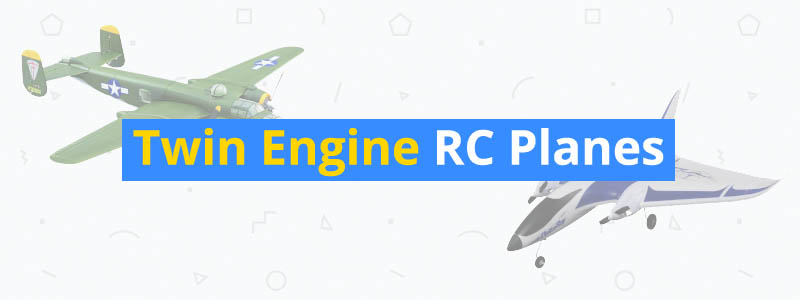

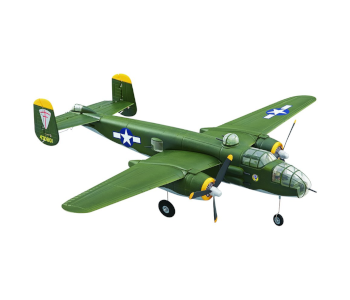 View on Amazon
View on Amazon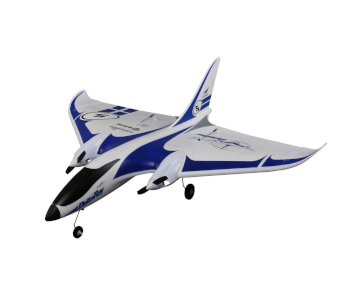 View on Amazon
View on Amazon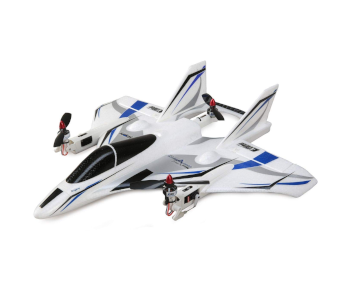 View on Amazon
View on Amazon